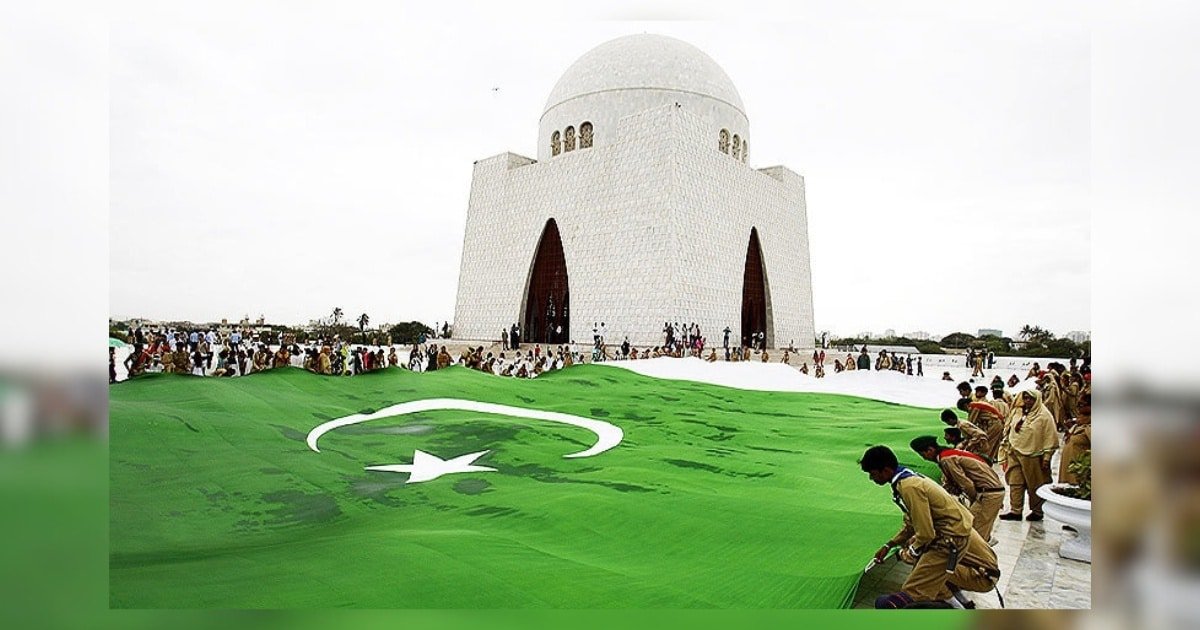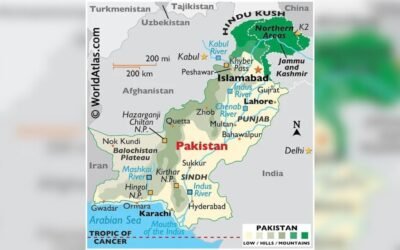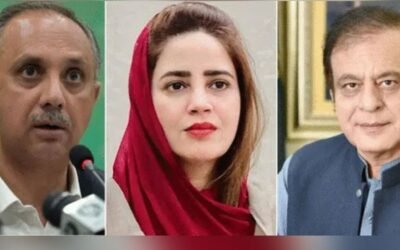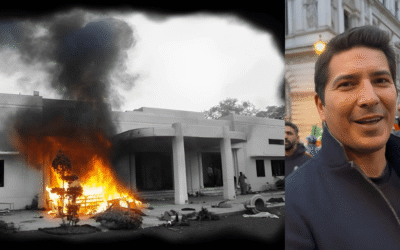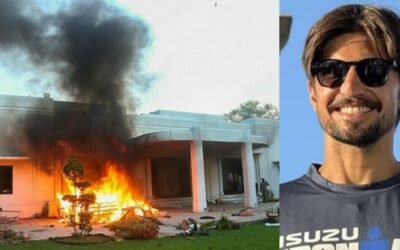National days are supposed to unify a nation and act as reminders of its national resolve. Pakistan also celebrates its Independence Day with patriotic fervor and zeal. There still are certain sectors, however, that do not rest on such important occasions as well and spread their vested agendas.14th August is often used as a backdrop for opposition parties and anti-state forces against which they build their rhetoric to give it a more appealing garb. Such parties make use of symbolic appropriation, agenda-setting rallies, media spectacle, and opportunistic violence.
The race of symbols: flags, anthems, and ‘ownership’ of patriotism
Political players often play at owning Independence Day by enveloping their messages with national symbols. They act like the sole custodians of patriotism, without whom Pakistan can not prosper. These parties call for rallies with the green-and-white flag and play national anthems to reassert that their agenda is the real driving force behind the nation’s ideals. Such theatrics of patriotism can very easily turn into abuse of national symbols. Different political parties use national days to propagate their agendas, especially at a time when visibility is greatest.

Source: DAWN
Opposition on 14 August: celebration turned into dissent
Independence Day guarantees attention, therefore opposition parties time their mobilisation to coincide with it in the form of outright protest sometimes or as ‘celebrations’ with political content at other times. The most recent precedent of this happening is PTI’s 2014 Azadi March, which was launched on 14 August and sustained for months. PTI framed it as a struggle to ‘restore’ the people’s mandate.The march actively used Independence Day optics to amplify claims of electoral injustice. The same playbook is being followed in 2025, but with some strategic readjustment. Following demands from PTI leadership for a fresh bout of agitation, the government publicly asked the party not to hold demonstrations on August 14, specifically so as not to take over national celebrations. PTI leaders subsequently changed the plan. They declared that 14 August activities would be ‘celebratory’ while also continuing to promote ‘freedom’ as well as the party’s issues. Dawn had an interesting sketch made on the matter:
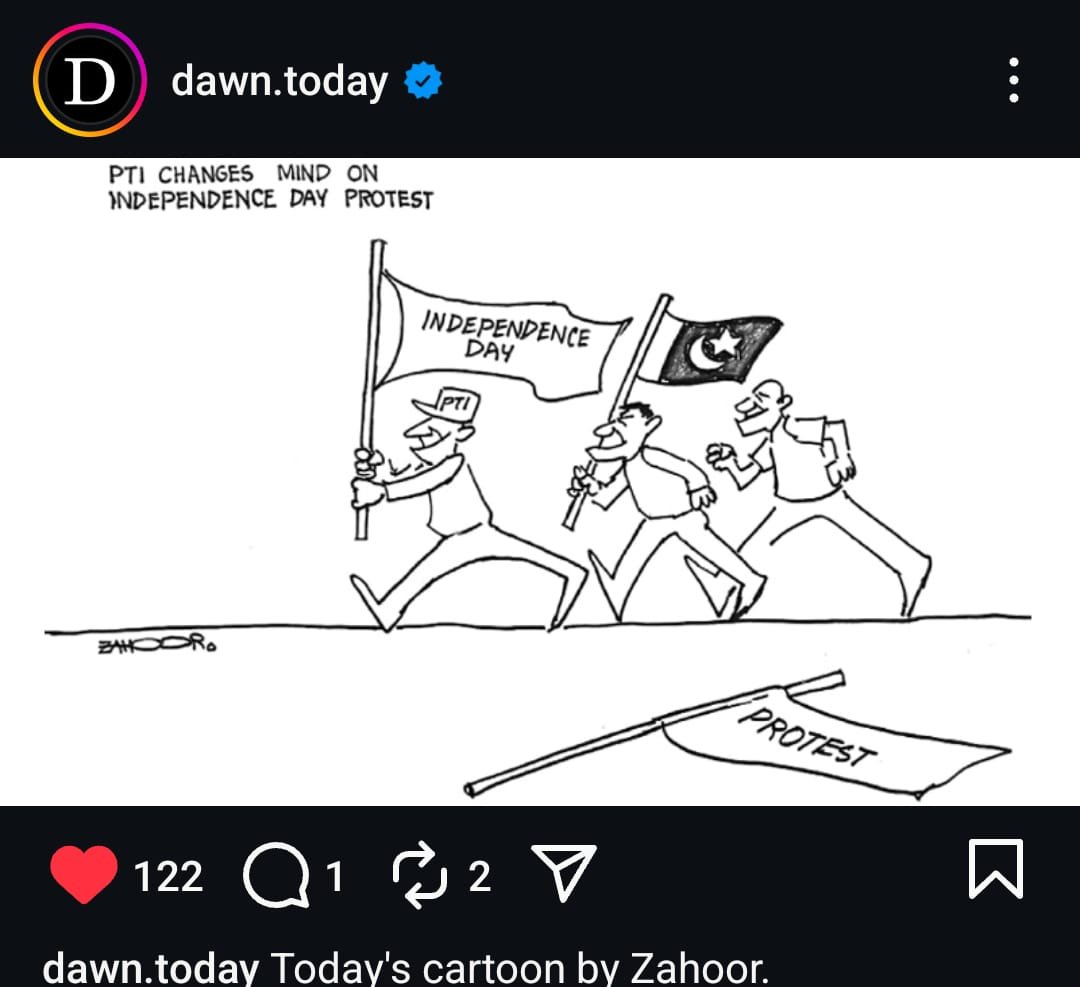
Source: Instagram
When politics collides with the rulebook
Pakistan has a formal regulatory environment for political activity. The Code of Conduct of the Election Commission states that parties must follow orders and not engage in activities that disrupt public peace. These injunctions have been applied whenever rallies coincide with national events. Opposition parties, however, have regularly disobeyed by vandalizing public property and causing chaos during election seasons. This is an ongoing trend that tends to pick up pace on high-visibility dates.
The media spectacle and digital narratives
National days are bound to attract guaranteed media coverage. The parties make use of this by holding eve-of-events rallies (13 August) and coordinated social-media campaigns to set their agendas in motion and gain media traction. Opposition as well as incumbents deploy national symbolism and crisis frames to make followers take to the streets. This cyber-halting reaches a peak on red-letter events. Even the crisis or national tragedies are used by these parties to further their own narrative.
PTI is once again trying to turn national occasions into political battlegrounds. Their protest calls for August 5 and August 14 are no coincidence, these dates hold deep national importance, representing our unity, sacrifices, and shared history. Yet PTI chooses to exploit them,… pic.twitter.com/i0MknvWsQ4
— Shahid Khaqan Abbasi ( Fan ) (@Khaqanabbasifan) August 13, 2025
How anti-state actors exploit Independence Day
Separatists and terrorists intentionally schedule threats and attacks for August. The objective is to shock, demoralize public morale, and humiliate the state on its birthday. Pakistani research institutions reported a steep increase in violence in the month of August in 2024, especially in Balochistan. Both the Pak Institute for Peace Studies (PIPS) and the Pakistan Institute for Conflict and Security Studies (PICSS) have reported a spike in violence in the month of August. PICSS declared August the deadliest month of the year, a claim that holds true in light of later threats and security restrictions ahead of Independence Day in 2025.
In don’t post the stuff by terrorists but this is important for Pakistanis. Terrorist BLA offers to be India’s military arm if it attacks Pakistan.👇
“We assure India, that if it makes the final decision to eliminate Pakistan, BLA is ready to attack from western border. We will… pic.twitter.com/N5WC8wBdMI— MARKHOR 𓄅 (@MarkhorTweets) May 11, 2025
During the 2024 pre-August 14 celebrations, Baloch militant alliances openly expressed their intentions to strike at security personnel, and violence did increase. With authorizing powers approaching 14 August 2025, authorities have once more increased security controls, with local governments limiting celebrations and restricting mobile internet in Balochistan to thwart coordination by militant group.s New ISPR releases this week have also outlined a stepped-up counter-militancy drive in the province of Balochistan and KP:
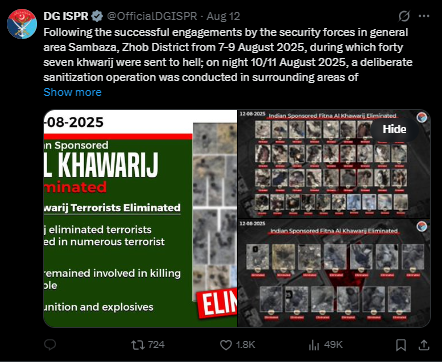
Source: OfficialDGISPR
Militants have a two-fold objective: to take over the news cycle on a symbolic date and to present the state as incapacitated or preoccupied with internal political infighting. Where opposition rallies and security alerts intersect, it allows for an appearance of national chaos that is sought by anti-state players. There are macro as well as microeconomic fallouts. Reports from Quetta stated that flag-sellers were afraid of selling their goods for fear of attack by militants. This highlights how August insecurity keeps civic celebrations in abeyance.
You May Like To Read:
- Beyond the Ballot: Can Citizens Shape Policy in the Digital Age?
- Indus Waters Treaty: Quick Reference
- ATC Lahore Issues Mixed Verdicts in May 9 Riot Cases
When Independence Day starts being used for ‘who is the nation’s representative’, three dangers arise:
Narrative crowding: Civic ideals, cultural pluralism, and constitutional milestones are eclipsed by party slogans. This damages the uniting role of national symbols.
Security load: Contradictory signals (protest and celebration) put pressure on policing, encourage court fights over permits, and widen the vulnerability windows that militants exploit. The administrative capacity is taken up by political theatrics instead of popular celebration.
Undermining of the rule of law: Regular violations of codes (graffiti, road obstacles, encroachments) make a mockery of days that should actually exemplify civic discipline and routine.
On 14 August, opposition parties tend to reinterpret ‘celebration’ as a referendum against the government while anti-state elements attempt to terrorize the same platform. The result is a battle for the country’s symbols and narrative. Bolstering rule-of-law processes, security cooperation, and participative civic programming can help maintain Independence Day for what it ought to be. August 14 must be celebrated as a reflection of Pakistan’s collective future, rather than merely its political fault lines. The Pakistani nation must celebrate Independence Day with all the enthusiasm and joy that the day warrants, but within the limits of civic sense and responsibility.

